您现在的位置是:首页 >其他 >c# vs2013 制作水晶报表并导出为 pdf网站首页其他
c# vs2013 制作水晶报表并导出为 pdf
简介c# vs2013 制作水晶报表并导出为 pdf
一两年前接触的,当时没有记录,现在把他写下来。
vs2013制作水晶报表,应该要用到插件安装,可以自行搜索安装插件。
在Views/RPT文件夹下创建.rpt后缀的水晶报表文件(这里的文件夹位置根据自身随意更改)。
在Data文件夹下(文件夹位置根据自身随意更改),创建DataSet数据集
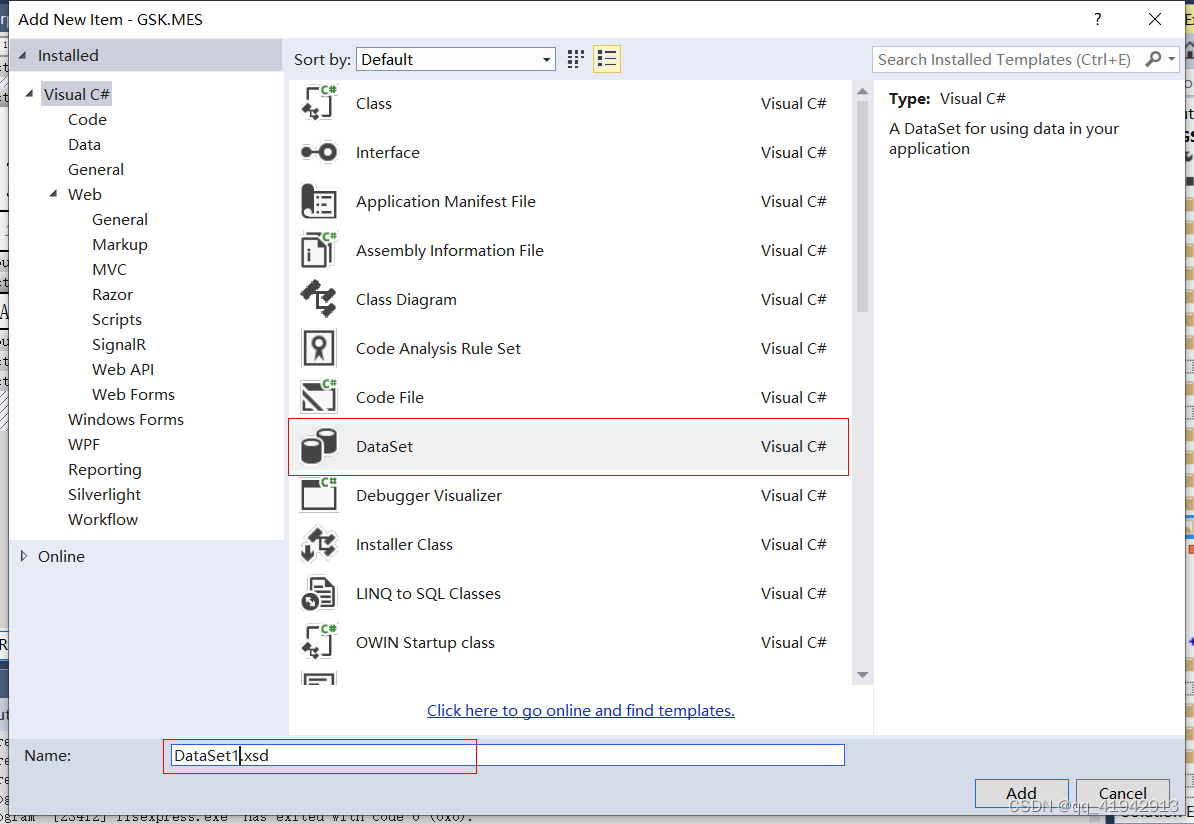
创建好后,在页面右击Add-DataTable添加表,更改datatable的名称,同样在表内右击Add-Column添加列,输入列明(自定义)
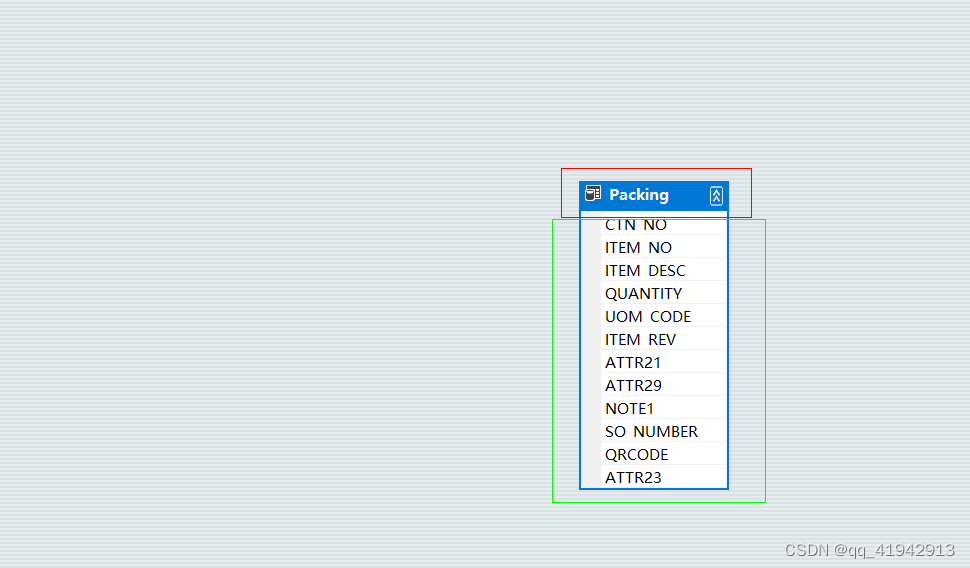
在.rpt报表文件页面,先将刚刚创建的DataSet的表导进来。在左边的导航,右击 Database Fields,选择Database Expert
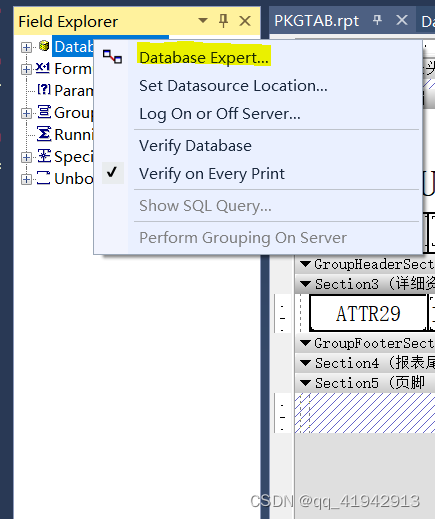
我的连接-DataSet1-Packing,点击>按钮,将该datatable表导进来,确定。待会就可以拖拉这个表里的列。
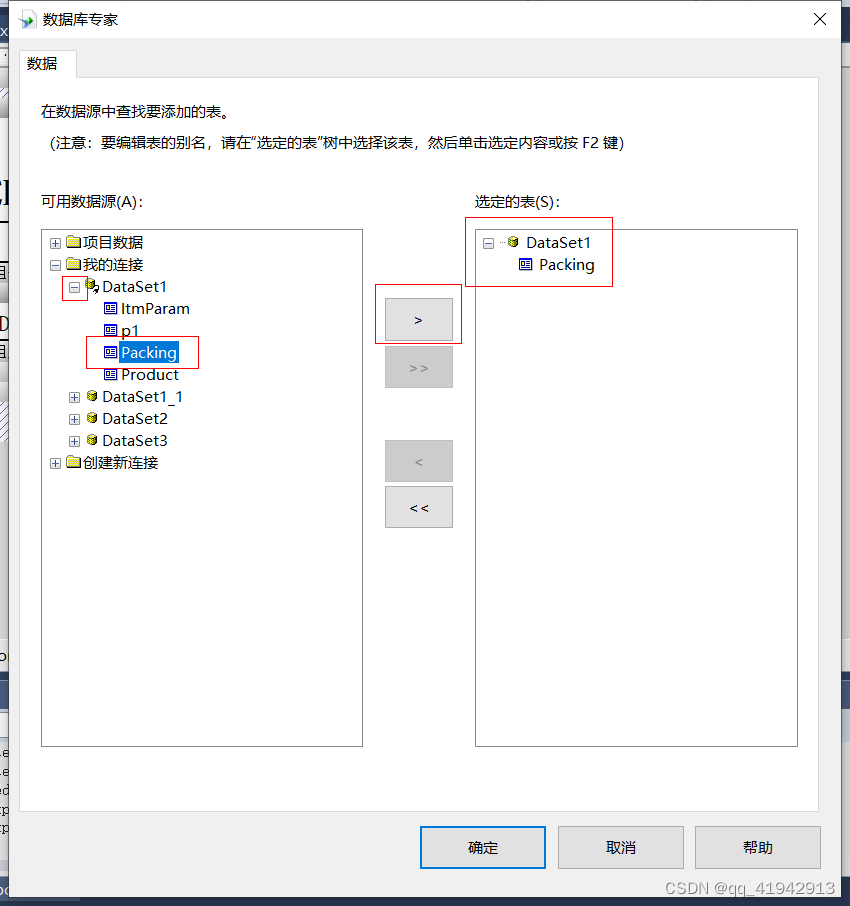
在里面画表格。改字体、字号大小、画线、不用到的报表头之类的就隐藏掉等。我这里是一个已经画好的表格,在页眉部分用到了分组功能,(为了让表格头不循环,表格体 列要循环显示,就将表的id作为分组名 来达到这样的目的)。
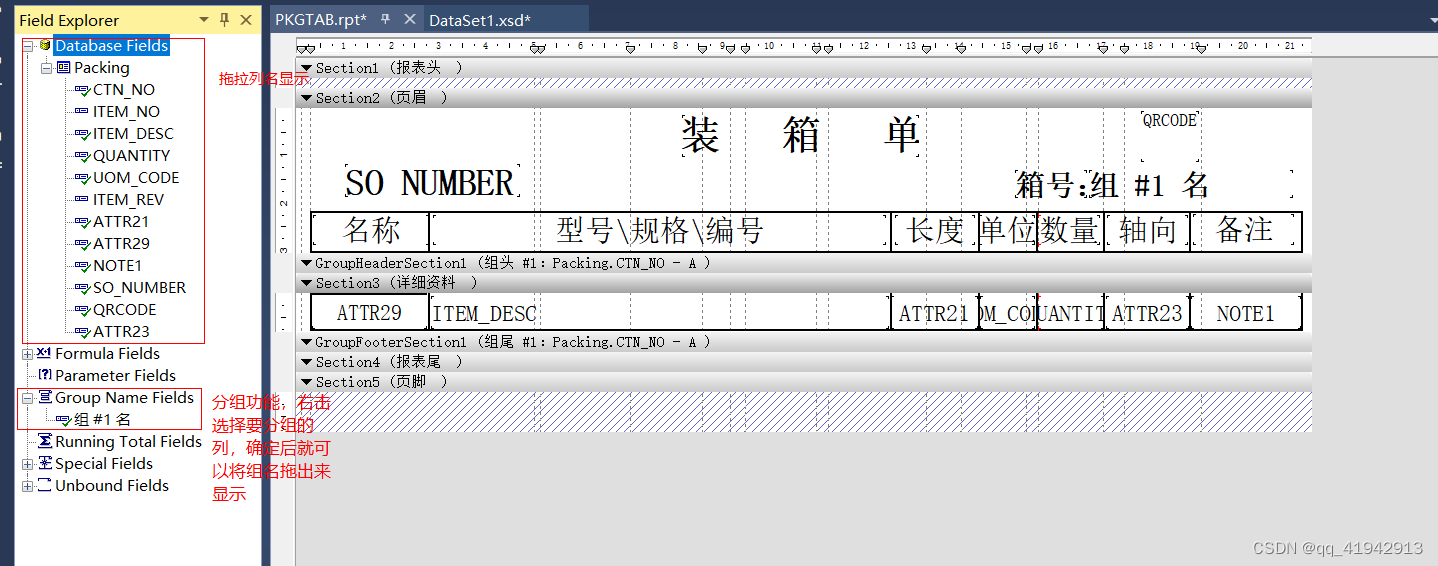
填充数据至表格,并导出为pdf。(我用的是一般处理程序,有什么不同根据自身修改)
后端代码,前端调用PrintPacking方法
using CrystalDecisions.CrystalReports.Engine;
using CrystalDecisions.Shared;
using Newtonsoft.Json;
public void PrintPacking(HttpContext context)
{
try
{
string rptName = "PKGTAB";//.rpt报表文件名称
List<数据库表名> list = new List<数据库表名>();//源数据表
DataSet1 ds1 = new DataSet1();//实例化数据集
//分箱数
List<int> _countr = list1.Select(t => t.COUNTR).Distinct().ToList();
if (list1.Count > 0 && head.Count > 0)
{
foreach (var item in list)
{
//循环将数据添加进去
ds1.Packing.AddPackingRow(item.CTN_NO, item.ITEM_NO, item.ITEM_DESC, item.QUANTITY, item.UOM_CODE, item.ITEM_REV, item.ATTR21, item.ATTR29, item.NOTE1, item.SO_NUMBER,item.qrcode, item.ATTR23);
}
m_responseData = new PrintHandler().ExportPDF(ds1, rptName);
}
}
catch (Exception ex)
{
}
string jsonString = JsonConvert.SerializeObject(m_responseData);//Json序列化,JSON对象转成JSON字符串
context.Response.Write(jsonString);
}
//导出PDF格式
private ReportDocument docReport = new ReportDocument();//全局变量 私有
//DataSet1 ds1
//rptName:.rpt水晶报表文件的名称
public bool ExportPDF(DataSet1 ds1, string rptName)
{
bool flg=false;
if (ds1 != null && !string.IsNullOrEmpty(rptName))
{
try
{
string _rptName = HttpContext.Current.Server.MapPath("/Views/RPT/" + rptName + ".rpt");
docReport.Load(_rptName);
docReport.Database.Tables[0].ApplyLogOnInfo(CryReport.GetLogonInfo());
docReport.SetDataSource(ds1);
DiskFileDestinationOptions diskOpts = new DiskFileDestinationOptions();
docReport.ExportOptions.ExportDestinationType = ExportDestinationType.DiskFile;
docReport.ExportOptions.ExportFormatType = ExportFormatType.PortableDocFormat;
string filePath = HttpContext.Current.Server.MapPath(@"/" + rptName + ".pdf");
diskOpts.DiskFileName = filePath;
docReport.ExportOptions.DestinationOptions = diskOpts;
docReport.Export();
docReport.Dispose();
flg=true;
//m_responseData = new ResponseData(true, rptName, string.Format("成功输出文件{0}.pdf.", rptName));
}
catch (Exception ex)
{
}
}
else
{
m_responseData = new ResponseData(false, "报表数据源或报表名为空");
}
return flg;
}
前端:
$.ajax({
type: 'post',
async: false,
url: '',
success: function (data) {
var obj = eval('(' + data + ')');
if (obj.Success) {
var filename = "PKGTAB";
var target = "/Views/POP/File?filename=" + filename + ".pdf";//新建一个页面File.aspx 我这边放在/Views/POP/目录下
window.open(target);//打开一个新页面将pfd显示出来
error.hide();
} else {
error.show().html(obj.Message);
}
}
});
新建的File.aspx页面,打开File.aspx.cs页面,protected void Page_Load(object sender, EventArgs e)函数改成如下:
protected void Page_Load(object sender, EventArgs e)
{
string _fileName = Request.QueryString["filename"];
string filePath = Server.MapPath(@"/" + _fileName);
if (!IsPostBack)
{
//PDFPreview.Priview(this, filePath);
//判断文件的存在
System.Web.UI.Page p = this;
if (System.IO.File.Exists(filePath))
{
p.Response.ContentType = "Application/pdf";
string fileName = filePath.Substring(filePath.LastIndexOf('\') + 1);
p.Response.AddHeader("content-disposition", "filename=" + fileName);
p.Response.WriteFile(filePath);
p.Response.End();
}
}
}
打开File.aspx.designer.cs,public partial class File方法改成如下:
public partial class File
{
/// <summary>
/// form1 control.
/// </summary>
/// <remarks>
/// Auto-generated field.
/// To modify move field declaration from designer file to code-behind file.
/// </remarks>
protected global::System.Web.UI.HtmlControls.HtmlForm form1;
}
效果
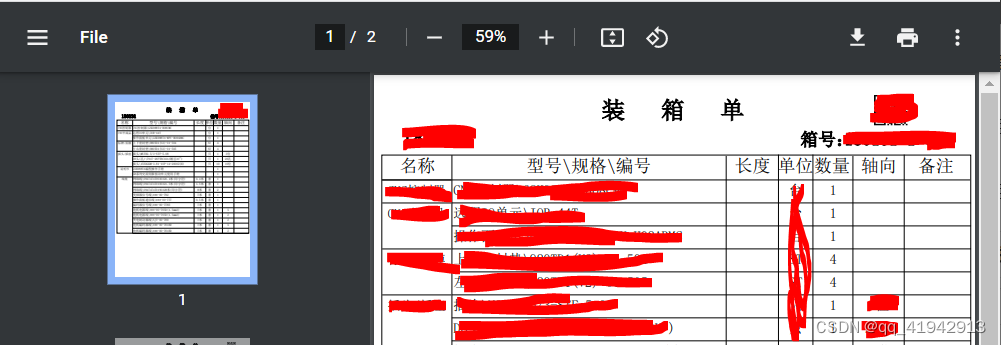
风语者!平时喜欢研究各种技术,目前在从事后端开发工作,热爱生活、热爱工作。






 QT多线程的5种用法,通过使用线程解决UI主界面的耗时操作代码,防止界面卡死。...
QT多线程的5种用法,通过使用线程解决UI主界面的耗时操作代码,防止界面卡死。... U8W/U8W-Mini使用与常见问题解决
U8W/U8W-Mini使用与常见问题解决 stm32使用HAL库配置串口中断收发数据(保姆级教程)
stm32使用HAL库配置串口中断收发数据(保姆级教程) 分享几个国内免费的ChatGPT镜像网址(亲测有效)
分享几个国内免费的ChatGPT镜像网址(亲测有效) Allegro16.6差分等长设置及走线总结
Allegro16.6差分等长设置及走线总结